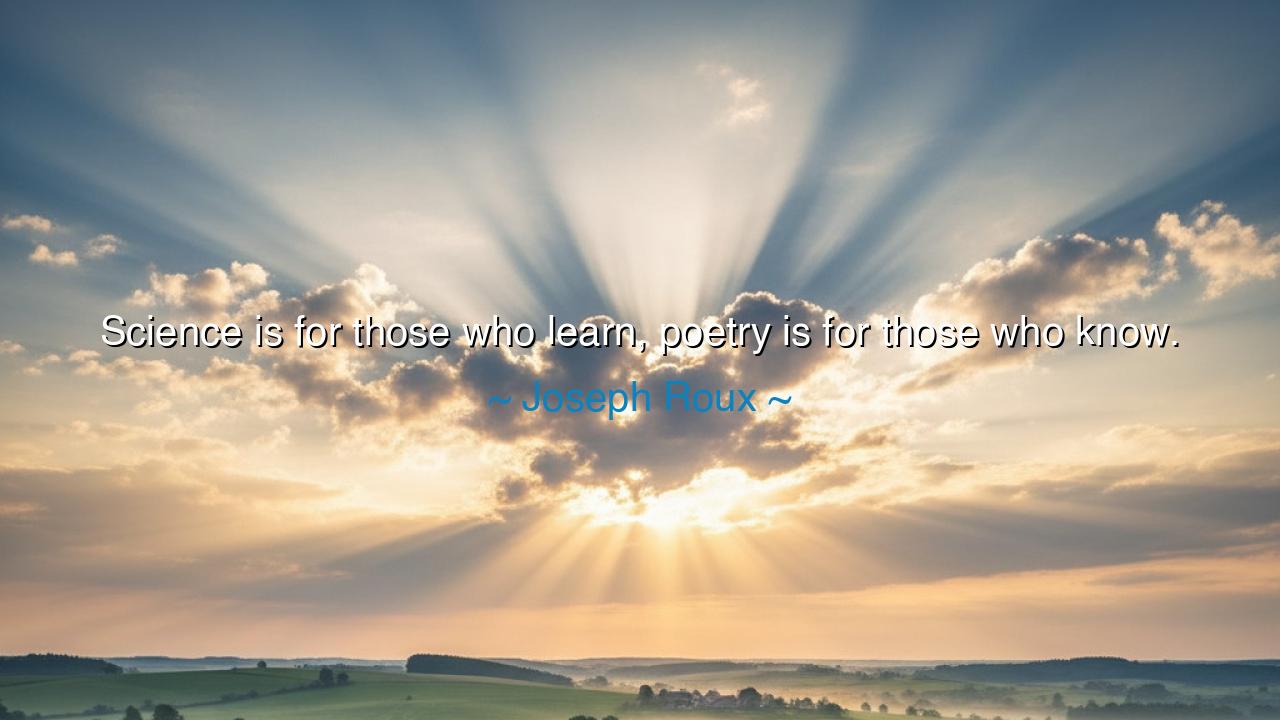
Science is for those who learn, poetry is for those who know.






"Science is for those who learn, poetry is for those who know." Thus spoke Joseph Roux, unveiling a wisdom that strikes like a double-edged sword, dividing the realms of inquiry and revelation. For science is the discipline of the mind, the patient gathering of knowledge, the step-by-step ascent from ignorance toward understanding. It belongs to those who seek, those who ask, those who measure. Yet poetry is the speech of the soul, the direct vision of truth without the scaffolding of reason. It belongs not to the apprentice who learns, but to the seer who already knows.
This does not diminish science, for without its labor the world would still be cloaked in shadow. The discoveries of Newton, Darwin, and Einstein have lifted humankind into new realms of comprehension. Science teaches us the structure of the cosmos, the laws of motion, the depths of the sea, the vastness of the heavens. It trains the eye to see what was hidden, the ear to hear what was silent. Yet, even so, science remains a path of learning, forever reaching, forever revising, forever hungry. It is a noble pursuit, but always one of striving.
Poetry, however, is of another order. It does not seek; it beholds. It does not crawl step by step toward truth; it leaps into the heart of it. The poet does not only learn about love—he knows it, feels it, burns with it, and so speaks its reality in words that bypass the intellect and pierce directly into the heart. Where science dissects the flower to understand it, poetry inhales its fragrance and proclaims, “Here is beauty, here is life.” Thus poetry is for those who already stand in the presence of truth and give it voice.
History gives us vivid examples. When Galileo pointed his telescope to the heavens, he learned the truth that the earth moved. His was the work of science—slow, rigorous, fought for in the teeth of resistance. Yet centuries before, when Homer sang of Helios driving his chariot across the sky, it was not learning but knowing: a poetic expression of humanity’s awe before the sun’s power. One spoke with precision, the other with vision. Both pointed to truth, but one through learning, the other through knowing.
Or consider the Great War of the twentieth century. The scientists measured the destruction, calculated the shells, designed the machines of battle. Their learning was vast. But it was the poets—Wilfred Owen, Siegfried Sassoon, Rupert Brooke—who knew the horror, the grief, the futility. Their lines did not describe the war as data; they revealed its soul, its anguish, its reality beyond numbers. Science gave facts; poetry gave truth.
The lesson for us is profound: we must walk with both companions—science to teach us, poetry to remind us. To live only by science is to accumulate knowledge without wisdom. To live only by poetry is to drown in vision without anchor. But together, they balance: the mind disciplined, the soul awakened. The learner must also become the knower; the knower must also remain the learner.
Practically, this means we should cultivate both reason and imagination. Learn from the world with the diligence of science: observe, measure, question. But also embrace the knowing of poetry: reflect, feel, create, and let intuition speak. Read the discoveries of scientists, but also the verses of poets. Write not only reports, but reflections. Seek not only information, but meaning.
So remember, children of tomorrow: "Science is for those who learn, poetry is for those who know." Do not choose between them; embrace both. Learn with your mind, but know with your heart. For knowledge without wisdom is hollow, and wisdom without knowledge is blind. Together, they form the full stature of the human soul—one that seeks, one that knows, one that lives in truth.






TMNGUYEN THI MINH
This quote seems to suggest that science and poetry speak to two different types of understanding—one intellectual and one intuitive. Does this mean that to fully grasp life, we need both science and poetry in our lives? I wonder how the balance between learning and knowing shapes our perspective on the world. Can someone who excels in science also connect deeply with poetry, or are these two ways of understanding fundamentally separate?
TSTuyet Suong
Roux’s comparison between science and poetry made me think about the different ways we come to understand the world. Is science about intellectual learning, while poetry comes from a more intrinsic place of knowledge? Can poetry help us understand what science cannot, or is there a specific role for each in deepening our grasp of reality? How do we reconcile these two very different ways of knowing?
NPNhi Phuong
This quote raises a question for me: is there a limit to what science can teach us, and does poetry offer a different, perhaps more personal, way of knowing? If science is about facts and learning, is poetry about feelings and deeper truths that can’t always be expressed in words? I wonder if we can truly know something through poetry in the same way we learn something through scientific study.
ATNguyen Anh Thu
I find it interesting that Roux makes a distinction between science and poetry based on how we approach knowledge. Science requires learning, a systematic accumulation of facts, while poetry seems to require a deeper, more intuitive knowing. Can both of these forms of understanding coexist, or is one more valuable than the other? Does one require more intellect, while the other taps into the heart and soul?